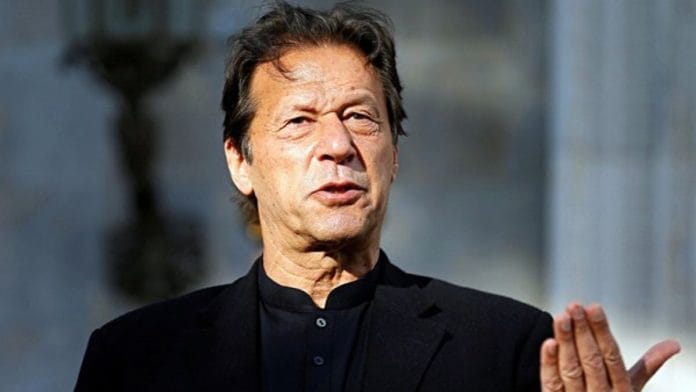New Delhi: A contentious Election Amendment Act passed in the Pakistan Parliament has sparked fierce debate and intense opposition protests in Pakistan.
It has struck fear in the hearts of many members of Imran Khan’s Pakistan Tehreek-e-Insaf.
The Act would prevent independent lawmakers from joining a party after a set period. PTI members rose in anger when it was passed and surrounded the speaker’s desk, tearing up the agenda, shouting slogans.
Critics view it as a ‘politically motivated legislation’ that is aimed at restricting PTI. The Act was introduced as a bill on 30 July, after a Pakistan Supreme Court judgment from 12 July ruled on PTI’s right to reserved seats, which would lead to the party being the largest in the National Assembly.
“It [the Act] is a deliberate effort to undo the Supreme Court’s judgment,” said Supreme Court advocate Faisal Chaudhry to ThePrint.
He called it the continuation of the cover-up of electoral fraud by PMLN. “It seems to be a direct assault on the independence of the Judiciary and an illegal and unconstitutional encroachment in the judicial sphere that is squarely violative of the constitutional scheme and the basic structure of the constitution,” he added.
PTI has now challenged the Act in the Supreme Court, calling it “unconstitutional and illegal”, The Express Tribune reported.
After Khan’s imprisonment and the ECP declared their party symbol invalid, PTI was not allowed to fight the General Elections held on 8 February. PTI members fought as independents and those who won put their weight behind Sunni Ittehad Council (SIC).
On 19 July, the ECP announced that it would implement the Supreme Court’s ruling, allowing PTI-backed MNAs to participate in the Assembly under the PTI banner. If the Supreme Court’s 12 July judgment is implemented, PTI would become the largest party in the National Assembly and the ruling coalition would lose its two-thirds majority in the lower house of parliament.
Also read: Imran Khan’s one year in jail. And his all-new love for Pakistan Army
What is the Act about?
The Elections (Second Amendment) Act 2024, passed on 6 August, bars independent candidates from joining political parties after a designated period post-election. Furthermore, candidates who fail to submit an affidavit of party affiliation to the returning officer will be classified as independents, making their subsequent affiliation with a party invalid. It also adds that a political party failing to submit its list of candidates for reserved seats within the deadline set by the Election Commission of Pakistan (ECP) will forfeit the opportunity to submit a list later.
The amendment now includes a new provision, Section 104A, to clarify the status of independent candidates who join a political party after winning a seat. This section states that once an independent candidate decides to join a party and gives their consent, that decision is final and cannot be changed, Dawn reported.
Supreme Court advocate Salman Akram Raja who filed the petition challenging the amendment on 7 August on behalf of PTI told ThePrint that the restriction introduced by Section 104A of the Election Act 2017 does not apply to the circumstances of the General Election 2024.
“If a candidate is incorrectly classified as an independent by the ECP and is forced to join a different party than the one they actually represented during the election, they should still be allowed to declare their true party affiliation. Preventing such a declaration undermines the constitutional rights of Pakistani citizens and disrupts the democratic process envisioned by the Constitution,” he said.
The Amendment Act, introduced in the National Assembly by PMLN lawyers Bilal Azhar Kayani and Zeb Jaffar as a private member’s bill, aims to address issues in the Elections Act 2017. But critics speculate it may have been introduced due to to the Supreme Court’s July 12 ruling on reserved seats for PTI.
In the said ruling, the Supreme Court, through a 13-judge full bench, significantly undermined Prime Minister Shehbaz Sharif’s ruling coalition by affirming that the PTI is entitled to reserved seats for women and non-Muslims.
“The amendments are an attempt to address the conditions on which the afore-described verdict of the apex court is based, even though the amendment bill nowhere in its text expressly or directly refers to the verdict itself, ” journalist Asad Jamal wrote.
The PTI alleged that the Act is a politically motivated effort to prevent their representatives from joining the party and claiming their due seats.
PTI’s Ali Muhammad Khan criticised the Act as an unconstitutional attack aimed at stripping the judiciary of its authority, asserting that it targeted PTI’s rights and political representation.
Critics argue that this legislation undermines democratic principles. Many are alleging that the current government, seen by many as military-backed, is using its parliamentary majority to consolidate power and further disenfranchise Opposition parties.
“It would amount to a soft coup d’etat by the government,” Chaudhry said.
(Edited by Theres Sudeep)






